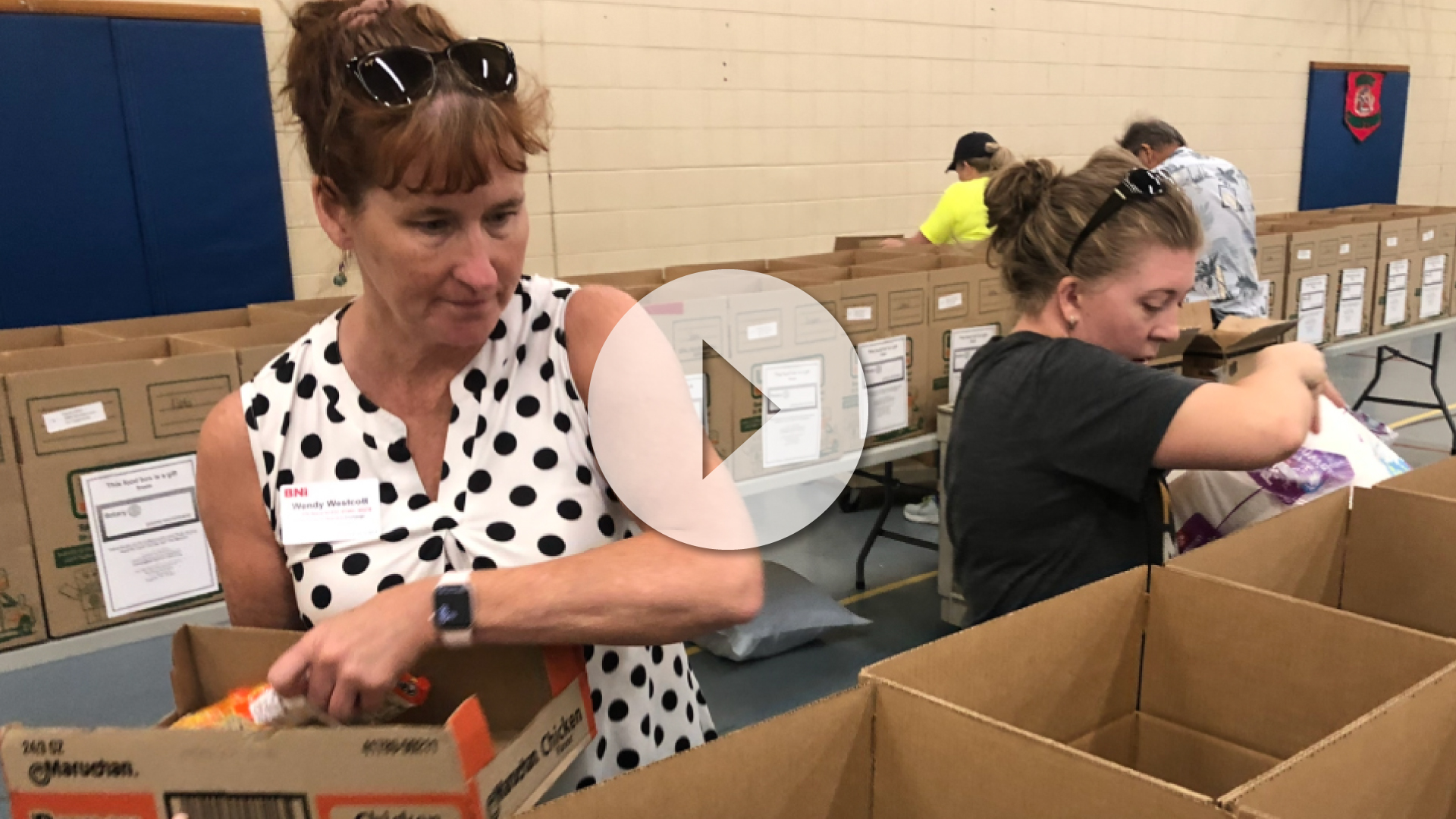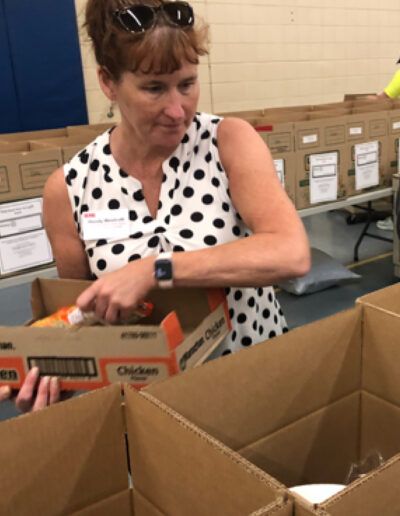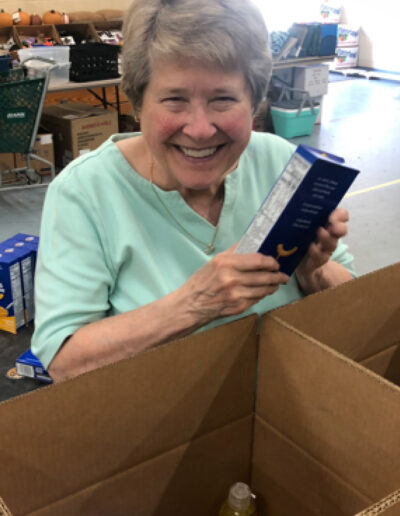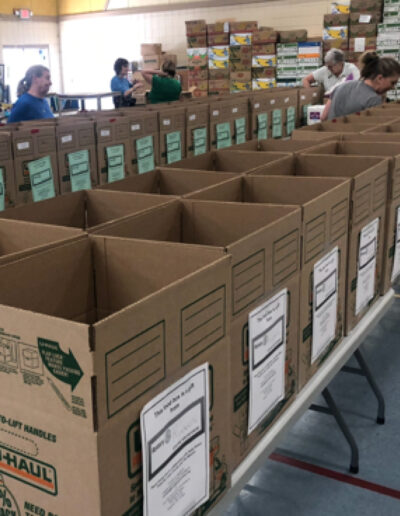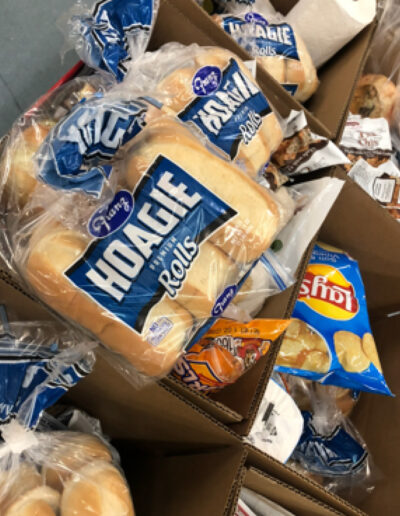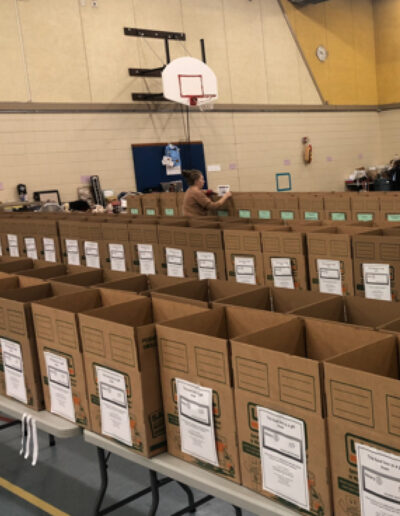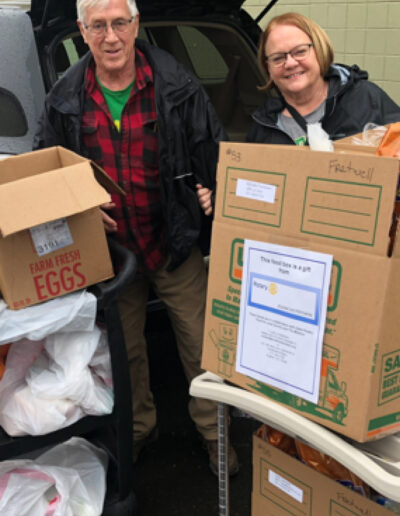
Southtowne Rotary Featured in the News!
We’re proud to share that Southtowne Rotary has been highlighted in a recent NBC16 article for receiving a $7,500 grant from the Cow Creek Umpqua Indian Foundation. This funding will help us continue our mission to support local families in need. You can read the full story and learn more about how we’re making a difference in the community here.
Thank you for your continued support!
Food Box & Emergency Services Fundraiser
Hundreds of family members have depended on our food box deliveries in order to meet their basic needs. Delivering food boxes has been both heartbreaking and heartwarming. On the one hand, we have come face to face with families, including children, who had gone hungry for days. But when they open their door to a delivery of fifty-plus pounds of fresh, nutritiously balanced food, it’s clear that this is what community is all about. Over a twelve-month period, we delivered nearly eighteen tons of food! They open their doors to a community member who cares about them! These families recommended by our community partners also experience emergencies and have needs for cleaning, sanitizing, and sometimes diapers and wipes, items not able to be purchased with food stamps. Our food boxes and our programs expand to meet these ongoing emergencies.
Meanwhile, the number of homeless youth and adults in our town is staggering. Our Southtowne Rotary Club rolls up its sleeves to support the SVDP Youth House, Hosea Youth Services drop-in center, the Mission, 15th Night, 4J’s McKinney-Vento program, 4J’s ECCO High School, and other partnerships with St. Vincent de Paul. Our club volunteers work for free, of course, but these programs all require financial support as well.
We are stretching every dollar to the max…but we NEED YOUR HELP. Our Fundraising Campaign goal is to raise at least $15,000, which would fund most of these program costs. Please consider making a donation today!
Food Boxes Program
For the past ten years, Southtowne Rotary volunteers have compiled and distributed food boxes to local families. Families in need can request a food box through our community partners, including all Bethel Elementary and Middle Schools (recommended by school counselors), current emergency needs, and Plaza de Nuestra Comunidad (Downtown Languages). We then deliver the food boxes directly to where the family lives, or arrange a way for families to pick up the food boxes from us. Non-perishable boxes are delivered directly to our partners.
By working with our community partners, we can get our food boxes to families who need them the most. This program is a valuable resource for our partners as well. When a family in crisis comes to one of our partners and asks for assistance, our partners can call on us for a food box, and then give that to the family in need.
Collecting Food Donations
FOOD for Lane County and the Eugene Mission regularly donate perishable and non-perishable items for these boxes. We are grateful that FOOD for Lane County chose us as a P2 partner due to our long-term commitment to getting food to families in our community. Our relationships with these local organizations is what helps make this program so successful.
Our club needs to purchase additional items to complete breakfast, lunch, and dinner meals, as well as all non-food items. We’ve found that when we ask our partners and families what foods they need, we can create food boxes that are more helpful to them.
We make some boxes specifically for hispanic populations that are underserved by other food abundance programs. These boxes will include ingredients like rice, pinto beans, and black beans, that they can make many meals out of rather than just one.
Southtowne Rotary is an equal opportunity provider. All referrals come from our partners at Bethel School District, Head Start, and Downtown Languages. Read more about our non-discrimination policy.
Distributing Food Boxes
The economy has placed extra stress on members in our community, and the need for food assistance has increased dramatically. We’ve continued working closely with our partners to assemble and deliver food boxes. Thanks to Jenny Sink, principal at Fairfield Elementary, we have been using the Fairfield Elementary gym to make the boxes and hand them off to families. Camille Ronzio, a Southtowne Rotarian, has continued to organize this effort, through scheduling volunteer shifts and ensuring food boxes are ready to be delivered.
Over this time, over 40-50 Rotarians and community volunteers have helped on this project and we are currently delivering 90-100 food boxes to families each month. We’ve also expanded the supplies we offer to include important non-food items like diapers and soap. The feedback we have received from families receiving these boxes has been both inspiring and troublesome. We are continually learning how much food assistance like this is needed right now, especially with cuts in transportation, work opportunities, and shortages of staple foods in grocery stores. In the current climate, we plan to continue distributing our food boxes and help as many families as we can.
Recipient Quotes
“Thank you for All of your help thru out these past years. You are guys are so wonderful and kind. You are such beautiful blessing to many of us family and individuals 🙏❤️💝
Wishing you a wonderful rest of the year.”
“Realmente aprecio el apoyo y la dedicación que el Club Rotario brinda a la comunidad de Bethel. ¡Mil gracias por las cajas de comida!”
English – I truly appreciate the support and dedication that The Rotary Club provides for the Bethel community. Thank you so much for the monthly food boxes!
Examples Of Families Served By Our Food Boxes Program
- Single-parent household with 3 kids, living in an apartment. The parent rides the bus for transportation, as vehicle costs are too high, and works from 6-6 to support the family. Approximately half of the wages go for daycare. A food box is a great relief for this family and helps them make ends meet.
- A dual parent household of 5 kids. One parent works, one parent stays home to cut the cost of daycare. Parents use public transportation or walk. A food box helps this family cut the cost of groceries.
- Single parent household of 3 kids in an apartment. Circumstances have forced this parent to recently relocate to this area and they do not know anyone here. Currently unemployed. When offered the food box, the parent was grateful as the house did not have many “staples” to start with.
- Single parent family currently unhoused with 2 kids. Parent works part-time. A food box is great for this family as the items are non-perishable and most do not require a stove/oven to prepare/serve.
Examples Of Non-Food Items
- Each year community partners request needed school supply items for families of Bethel, McKinney Vinto, 4-J McKinney Vento, and other community partners. Partners ask us to provide school supplies for current needs such as notebook paper, backpacks, spiral notebooks, 3-ring binders, etc. Fundraising is necessary for meeting these needs.
- We have had requests for clothes, warm blankets, and quilts. We have had some blankets and quilts donated, but have had to purchase others.
May Food Box Report
May food boxes gave 97 families food during uncertain times that we are living in today. 4 of these boxes went to Pilas families for graduation celebrations, 12 went to Kiwanis, 4 were non-perishable going to Bethel homeless support and their health center families. In addition 4 went to Ukrainian families recently moved into our community. This month 5 went to Head Start families experiencing emergencies and an additional 4 went to families with high needs nominated by our Plaza Comunidad partner. They select the neediest families each month.
We had the help of 52 volunteers. For the first time one of our SOS scholarship recipients Elias Soto joined the volunteer crew. It was great to meet him. Pat Miller, Jantzen Lloyd, and Judy Swartz led the morning crew organizing the room and the boxes. Food for Lane County set aside apples and potatoes for us this month so we did not have to purchase any. In addition we got bread, onions, bananas, tomatoes and other great produce. We received some masa, extra dry goods and personal hygiene products from a new partner David from the Junction City pantry. They have a large storage area and often have more donations than they can use. We will be exploring this partnership as well as one with Lane County Bounty to see if we can broaden our scope of what we can get free.
Brian got the food from Winco. The Mission did not have food for us this month. David brought food. Jim Martin and Brian got the Food for Lane County food. Robert helped with the unloading and getting food to volunteers for sorting into boxes. Delta Rotary helped with donating toilet paper and detergent this month. This month club funds were spent for boxes. Costs were $1428. This includes purchased WInco food and boxes. We should get a $360 donation from Kiwanis for their boxes. They are also paying early for the June delivery for 11 boxes so another $330.
Other news is that we are moving to the Auxiliary gym for this summer and will be moving to Clear Lake school in the fall as Fairfield needs the space for students. We are working with the school district counselors who will manage a list of 50 families effective for our October boxes. Families will be reapplying and our September list from them will be small reflecting the time needed to re-evaluate families being served to select the most needy recommended by school counselors.
Volunteers
Southtowne & Satellite
Linda Anderson: 3 hrs (Calling)
Brian Papenous: 2 hrs (Truck)
Jim Martin: 5 hrs (mid month pick up plus Food for Lane county)
Karen Fretwell: 2 hrs (Deliveries)
Jim Fretwell: 2 hrs (Deliveries)
Randy Bernstein: 2 hrs (Deliveries)
Grace Widdicombe: 2 hrs (Deliveries)
Jean Stover: 2 hrs (Deliveries)
Linda Carnine: 2 hrs (Deliveries)
Susan Stafford: 2 hrs (Deliveries)
Mark Nyegaard and wife: 2 hrs (Deliveries)
Kayla Maudin: 2 hrs (Deliveries)
Travis Misfeldt: 2 hrs (Deliveries)
Frank: 2 hrs (Afternoon Help)
Kathi Hoffer: 3 hrs (Back door and afternoon help)
Chris Waugh: 2 hrs (Deliveries)
Doug Mozan: 2 hrs (Deliveries)
Betty Holst: 2 hrs (Afternoon Help)
Helen Williams: 3 hrs (Afternoon Help)
Jim and Pat Anderson: 2 hrs (Deliveries)
Jantzen Lloyd: 7 hrs (Morning & Afternoon)
Pat Miller: 15 hrs (Organization, labels, etc.)
Camille Ronzio: 20 hrs (Organization and day of and delivery)
Total: 25
Other Rotary Clubs
Kim Meyers | Delta: 2 hrs (Toilet Paper)
Gael Coyle | Delta: 2 hrs (Deliveries)
Sam Weber | Springfield: 2 hrs (Deliveries)
Rae LaMarche | Springfield: 2 hrs (Deliveries)
Total: 4
Partners
Judy Swartz: 4 hrs (Morning Help)
David Novak: 2 hrs (Afternoon Help)
Jenny Wilson: 2 hrs (Deliveries)
Kiwanis(3 Volunteers): 6 hrs (Deliveries)
Marilyn Kelly: 2 hrs (Deliveries)
Barry Brown & wife: 2 hrs (Deliveries)
Kate & Zeke Pryka: 2 hrs (Deliveries)
Debbie Kindt: 2 hrs (Deliveries)
Total: 12
Community
Tannya Comparte: 3 hrs (Calling)
Robert Goertz: 2 hrs (Truck & Helping)
Penny Klein: 4 hrs (Afternoon Help)
Laura Alden: 3 hrs
Hallie (Helen Williams’ friend): 2 hrs
Sherri Jones: 3 hrs (Morning Help)
Tina – Sherri Jones’ friend: 3 hrs (Morning Help)
Pam Farmer: 3 hrs
Mary Croskey: 3 hrs
Elias Soto: 3 hrs (Afternoon Help)
Oksana: 2 hrs (Deliveries)
Total: 11

